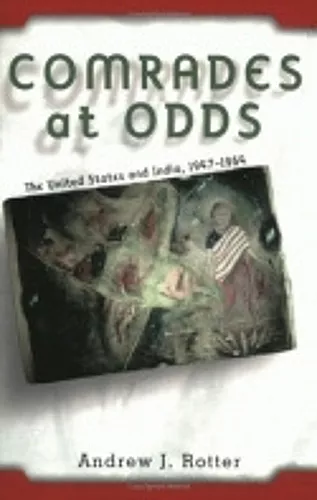Comrades at Odds
The United States and India, 1947–1964
Format:Hardback
Publisher:Cornell University Press
Currently unavailable, and unfortunately no date known when it will be back
This hardback is available in another edition too:
- Paperback£38.00(9780801484605)

Comrades at Odds explores the complicated Cold War relationship between the United States and the newly independent India of Jawaharlal Nehru from a unique perspective—that of culture, broadly defined. In a departure from the usual way of doing diplomatic history, Andrew J. Rotter chose culture as his jumping-off point because, he says, "Like the rest of us, policymakers and diplomats do not shed their values, biases, and assumptions at their office doors. They are creatures of culture, and their attitudes cannot help but shape the policy they make." To define those attitudes, Rotter consults not only government documents and the memoirs of those involved in the events of the day, but also literature, art, and mass media. "An advertisement, a photograph, a cartoon, a film, and a short story," he finds, "tell us in their own ways about relations between nations as surely as a State Department memorandum does."
While expanding knowledge about the creation and implementation of democracy, Rotter carries his analysis across the categories of race, class, gender, religion, and culturally infused practices of governance, strategy, and economics.
Americans saw Indians as superstitious, unclean, treacherous, lazy, and prevaricating. Indians regarded Americans as arrogant, materialistic, uncouth, profane, and violent. Yet, in spite of these stereotypes, Rotter notes the mutual recognition of profound similarities between the two groups; they were indeed "comrades at odds."
Andrew Rotter has written an original and thoughtful book on United States-Indian relations during the cold war.... This book should be read widely by diplomatic historians; it offers a model for future research and analysis and breakes important new ground in the study of international history.
* International Journal *An agreeable read, Rotter's book provides a great many probing observations on such varying matters as smell, space, family, and truth, along with assessments of their effect on the way policy was conceived and carried out.... What Rotter's fascinating work amounts to is really less a causal account than.... a myriad of vignettes, snapshots, details, and striking insights that forces one precisely not to conclude but to think.
-- Anders Stephanson, Columbia University * American Historical Review *In this original, imaginative and informative study, Rotter argues that cultural perceptions, perhaps more than any other factor, have affected policy makers in both America and the subcontinent when formulating policy toward each other. The result is a fascinating book.... Virtually every facet of culture is discussed and explained in masterly detail.
* Choice *Comrades at Odds illustrates both the virtues and the shortcomings of the new history. Rotter offers a subtle reading of heretofore-neglected source materials, and he adds to our understanding of the cultural side of this difficult relationship.... This book provides valuable insights.
-- Robert M. Hathaway * Wilson Quarterly *Rotter's study is as sophisticated and, at the same time, as commonsensical as the new approach gets. He dons theory but wears it lightly.... He interrogates such usual suspects as race and gender but adds religion, family, and folkways of economy and governance.... He has a good ear for anecdote and a good eye for the detail that illuminates the landscape.
-- H.W. Brands, Texas A&M University * Journal of American HistoISBN: 9780801434495
Dimensions: 235mm x 155mm x 27mm
Weight: 907g
368 pages